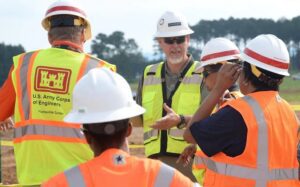 Gregory Pollock, Department of Defense’s principal director for Arctic and global resilience, and Joseph Bryan, senior advisor for climate and chief sustainability officer, appeared this month on a virtual panel to address climate change in U.S. defense strategy and budget at the Brookings Institution in Washington, D.C.
Gregory Pollock, Department of Defense’s principal director for Arctic and global resilience, and Joseph Bryan, senior advisor for climate and chief sustainability officer, appeared this month on a virtual panel to address climate change in U.S. defense strategy and budget at the Brookings Institution in Washington, D.C.
“This is a real recognition on behalf of the department of the ways in which climate change is fundamentally altering the strategic context in which the joint force operates,” Pollack said of those steps. “And we must adapt to those changing circumstances and adapt better and faster than do our competitors.”
DOD officials are cognizant that people are its most valuable asset, he said, adding, “and we need to invest in their understanding of these issues and the ways in which climate change intersects with their jobs, no matter what their day-to-day responsibilities [are].”
Every region of the world is deeply affected by climate change, but the Arctic is warming at three times the rate of the rest of the world, Pollack said. He added that the effects of climate change in Alaska are challenging the resilience of military installations there, and DOD is postured to make important investments for joint force operations.
“[What’s] true, fundamentally, is that climate change is increasingly setting the context for everything that we do. It is fundamentally shaping the terrain, fundamentally shaping capability and shaping our relationship with our operational areas and with our allies, adversaries and competitors,” Bryan said.
Climate change is driving a demand, and Bryan noted that from humanitarian assistance and disaster relief to instability driven by mass migration to changes in the Arctic, it’s impacting DOD’s readiness and ability to meet that demand.
“We have supply and demand lines that are going in both the wrong [directions], Bryan said. “And the space between those two lines represents risk for the department and risk to national security. We need to really think about that and invest to reduce that risk.”
Bryan called climate change a global phenomenon.
In the United States, DOD’s core mission is to fight and win wars, Bryan said. “And our fundamental belief is that we need to lead the kind of transformation that is happening globally, because it will enhance not only our capability, but also our ‘standing out’ in this world,” he said.
Pollock emphasized DOD is trying to think about climate change challenges through scenario planning and war games, which he said are some of the best tools to see how challenges manifest themselves in the future and how they’re already manifesting themselves in a number of parts of the world.
DOD is working closely with U.S. Southern Command and U.S. Indo-Pacific Command to think through climate challenges, Pollock said.
DOD is also working with the U.S. Africa Command, which Pollock described as forward-leaning and forward-thinking about the risks that climate change is going to pose to an already demanding security environment in Central East Africa, West Africa, North Africa and beyond.
“[It’s] really who adapts to this changing environment best that’s going to win in strategic competition, but we need to get ourselves organized to think about what the commodities of real significance [are, and their] real relevance for the future,” Pollock said.
The United States needs to work very closely with its allies and partners in Europe and beyond to make sure it has a strategy to position itself for strategic competition, Pollock said.
“I know our adversaries are doing that,” he noted. “And we probably have some room to improve in that regard,” he said.


